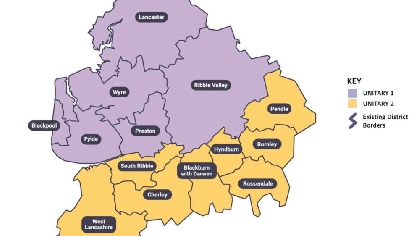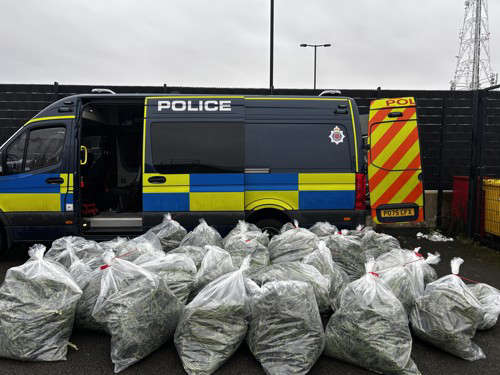
Lancashire County Council will tell the government that just two new local authorities should be created to replace the 15 that currently exist across Lancashire, as part of a radical shake-up being ordered by ministers.
County Hall’s ruling Reform UK group backed the establishment of standalone North Lancashire and South Lancashire councils at a meeting about the future shape of local government in the county.
The proposal will be submitted next week – once it has been ratified by cabinet members – in response to a request from the government for suggestions about how to streamline Lancashire’s local authority system.
However, Whitehall will also be asked to delay the creation of the new authorities by at least a year – until 2029 at the earliest – amid warnings that the planned timetable would cause “chaos” within key local services.
Under the county council’s vision, the new North Lancashire Council would incorporate the existing Preston, Blackpool, Fylde, Wyre, Lancaster and Ribble Valley council areas – and serve more than 722,000 residents.
Meanwhile, on the other side of the Ribble, South Lancashire Council would combine South Ribble, Chorley, West Lancashire, Blackburn with Darwen, Burnley, Hyndburn, Rossendale and Pendle – and provide services to just under 888,000 people.
Lancashire County Council leader Stephen Atkinson is a longstanding opponent to the principle of local government reorganisation (LGR) – the process by which ‘two-tier’ areas like Lancashire see their county and district councils scrapped and replaced with new ‘unitary’ bodies responsible for all local services in their area.
However, he told the meeting that as the government was insisting on the change, a two-council arrangement would best protect the services that mattered to people most.
But opposition politicians blasted what they characterised as “mega” authorities which it was claimed would be too distant from the residents they were intended to serve.
Between them, Lancashire’s 15 existing councils are expected to submit five suggestions for the number and shape of the local authorities that should replace them. The county council is the only one supporting a two-authority split, with options for three, four – in two different configurations – and five set to be put forward by others.
The county council’s proposal – which runs to more than 200 pages – claims that two new councils are the strongest model for ensuring the “financial resilience” of the new entities.
It suggests they would generate £391m in savings over the first five years of their operation, with recurring annual savings of £140m thereafter, when compared to the current total cost of local government in Lancashire.
County Cllr Atkinson (Ribble Valley South West) told the meeting that such financial stability would enable the new councils to deliver on residents’ priorities. He cited a survey undertaken in September in which almost two thirds of respondents said they would prefer to see the existing councils retained.
“What was clear [from] the people of Lancashire…was that they valued local services- they valued their parks, they valued street cleansing. So what we need in this proposal is one that gives the maximum financial capacity for councils to continue delivering those services,” he said.
The Reform leader – who ran Ribble Valley Borough Council as a Conservative for six years until the start of 2025 – said that if government rules permitted it, his preference would be for a single council across the whole of Lancashire. That option is not currently be allowed, because
Lancashire is an area with a combined county authority (CCA) delivering the area’s devolution deal – and so needs at least two councils to exist within its patch.
County Cllr Atkinson said the new North and South Lancashire councils would come with an “innovative solution” for more localised engagement than their broad borders may suggest.
The authority’s bid document refers to the introduction of “neighbourhood committees” as part of the new north/south split – a feature that County
Cllr Atkinson says makes both the two-council and even a one-council solution both workable and desirable.
Speaking separately to the Local Democracy Reporting Service (LDRS), he said it would be an even better arrangement than the current 12 district authorities like South Ribble, Wyre and Pendle, because the committees would be centred around towns – and would give councillors “much more direct input” and even access to funding for those smaller localities.
“This…gives the strategic advantage of the county council’s capacity, [but also] has the local decision making,” he said.
However, back at the meeting, opposition politicians lined up to condemn the sprawling nature of the county council’s proposed new authorities.
County Cllr Michael Lavelette (Independent, Preston Central East) warned that local government would end up having “very little connection with local areas”.
“They will become distant bureaucracies, with councillors with very little control over what is being offered,” he said.
Conservative group leader – and former cabinet member – Aidy Riggott (Euxton, Buckshaw and Astley) said that while he accepted “size and scale” matter in the creation of the replacement councils, there were nevertheless “natural limits” to both.
“I just don’t think that Reform’s proposal for a new southern council…that goes right over [from] the west of our county, stretching through Central Lancashire – yet somehow omitting Preston -…and reaching all the way to [Pendle] is credible or a well thought-out proposal.
“It would take somewhere from about an hour and 10 [minutes] to an hour and 40 [minutes] to drive – or about three-and-a-half hours on public transport – to get across this new [area],” County Cllr Riggott said.
He said the northern authority was similarly expansive – and suggested that the proposal did not meet the government’s own criteria for “efficiency” and “community engagement”.
Ministers have indicated that they would like newly-formed councils to cover populations of at least 500,000, but have said they would be flexible over proposals which came in below that level – and have also set no upper limit.
However, County Cllr David Whipp (Liberal Democrat, Pendle Rural) – who also leads Pendle Council, which is backing a five-authority option – said he was “appalled” at the suggestion the county council would ideally like to see a single Lancashire-wide body for almost 1.6 million people.
He said that recent experience of reorganisations elsewhere in the country showed that “smaller unitaries are able to make savings [and]… change the way that they do things – and [it is] the larger councils…that [are] struggling”.
The Liberal Democrat group leader at County Hall, John Potter (Preston West), said the two proposed new councils would face a “democratic deficit” – because of how many residents each councillor would have in their patch, with the number of elected members set to be capped at 100 for each new authority. The 15 existing councils have around 650 memebers between them.
He said that it was therefore “absolutely ludicrous” for Reform to suggest a “mega-council structure” – especially given their leader’s preference more the localised existing set-up – and he also called on the government to provide councils with sufficient funding.
County Cllr Potter said businesses were mostly in favour of a three or four-council option – adding that while the the process of disbanding the current arrangements would be “messy”, the “outcomes” on the other side could be better.
However, County Cllr Maheen Kamran (Independent, Burnley Central) called on colleagues to imagine being “asked to make a decision about a town you’ve never lived in, a town you’ve never worked in or a town you’ve never walked its streets” – and warned of local services being compromised in such a scenario.
On a similar theme, Our West Lancashire representative Adrian Owens (West Lancashire East) said the reason he and a party colleague had been elected to County Hall was because the county council was already “seen as a remote body” by residents in his patch – adding that they now also faced the loss of their more local, district council.
However, County Cllr Azhar Ali, the leader of the main opposition group, Progressive Lancashire – a coalition of independents and Greens – said the reality was that most of Lancashire was already “run from Preston”.
“The bulk of your services – whether it’s winter gritting, transport, highways, adult social care…are run from County Hall [except for Blackpool and Blackburn residents].”
He said he was personally “torn” between creating two or three new councils, but that it was how services were delivered by the new bodies that mattered.
County Cllr Mohamed Iqbal (Independent, Brierfield and Nelson West) criticised the Reform leadership for acquiescing to plans that they – and he – disagreed with.
He said County Cllr Atkinson could have formed a coalition of local leaders who said to the government, “No, we disagree with your diktat from Whitehall.”
In a separate part of the debate, County Cllr Atkinson had stressed that the government-ordered changes were “not wanted” – based on the survey results.
However he said his ruling group had “been responsible” by not making a “political point” and refusing to take part in the process.
A request he had made to the government for a legally binding referendum on the overhaul was refused by ministers earlier this year.
County Cllr Mark Wade (Reform UK, Chorley Rural West) said he believed the Labour government had “already decided” how many new councils it would create for Lancashire – and that the proposals process was “just theatre”.
“Every person in this chamber…knows that the decision will not be based on what is best for the people of Lancashire – it will be based on what is best for the Labour Party and their vote share,” County Cllr Wade declared.
His Reform UK colleague Joel Tetlow (Accrington North) said that faced with an unpalatable decision that it did not want to have to make, the party had opted for the “least disruptive” option.
However, Green Party group leader – and Progressive Lancashire deputy leader – Gina Dowding (Lancaster Central) suggested disruption was the default state of the shake-up that the government had set in train.
Warning that the new configuration, when it was finally agreed and then implemented, would take years to “bed in”, she said: “That process will mean distraction for… workers who will be worrying about their jobs and reapplying for newly-defined jobs [and] restructuring services – and none of that will be for the benefit of the people of Lancashire.
“There is scope for improvement [to the current system], but local government reorganisation in the structure that we have been forced down is not the answer.”
The North and South Lancashire Council proposal was approved as approved by a majority and will now go before cabinet on 27th November.
‘RECIPE FOR DIASATER’
As part of its proposal for creation of councils for North Lancashire and South Lancashire, the existing county council will ask the government to slow its planned timeline for the implementation of whatever changes are ultimately agreed – amid fears of a chaotic transition between the old and new arrangements.
On the current trajectory, elections to ‘shadow’ versions of the new bodies will be held in May 2027, before the councils officially come into being in April 2028 – at which point the existing 15 will be disbanded.
As the LDRS revealed last month, County Cllrs Atkinson, Ali, Riggott, Dowding and Our West Lancashire representative Gordon Johnson have already written to the government asking that the new authorities are not launched until either 2029 or 2030 – because of the risk of destabilising vital services if the process is rushed.
A similar request will now be made via the official bid submission document from the county council, following an amendment suggested by County Cllr Ali calling for the shadow elections to be held no sooner than May 2028 – thereby automatically pushing the launch date back to 2029 at the earliest.
He said the complexity of council staff job changes and people potentially taking the opportunity for early recruitment would be “a recipe for disaster” and “complete chaos”.
“Twelve further months [of] preparation…helps Lancashire County Council [to continue] deliver[ing] services for…the people on the ground in our towns and villages,” County Cllr Ali said.
County Cllr Atkinson said the suggestion was “very wise”, because there were “not enough” senior-level council officers in the country to fill so many posts being created at once by a restructure that was taking place concurrently in 20 other counties in England.
“If [all the changes] happen in one year…you would get vulnerable adults and children falling between the gaps,” he warned, citing expert evidence that the government itself only had the capacity to deliver three reorganisations at the same time nationwide.

 Controlling bully jailed after paralysing woman in violent assault
Controlling bully jailed after paralysing woman in violent assault
 Gang jailed after running Blackpool ‘drugs warehouse’
Gang jailed after running Blackpool ‘drugs warehouse’
 More than 570 cannabis plants seized at Blackpool property
More than 570 cannabis plants seized at Blackpool property
 Sex offender who tried to abuse children online jailed for seven and a half years
Sex offender who tried to abuse children online jailed for seven and a half years
 County Council unable to say pothole repair targets are being net due to ‘technical issue’
County Council unable to say pothole repair targets are being net due to ‘technical issue’








